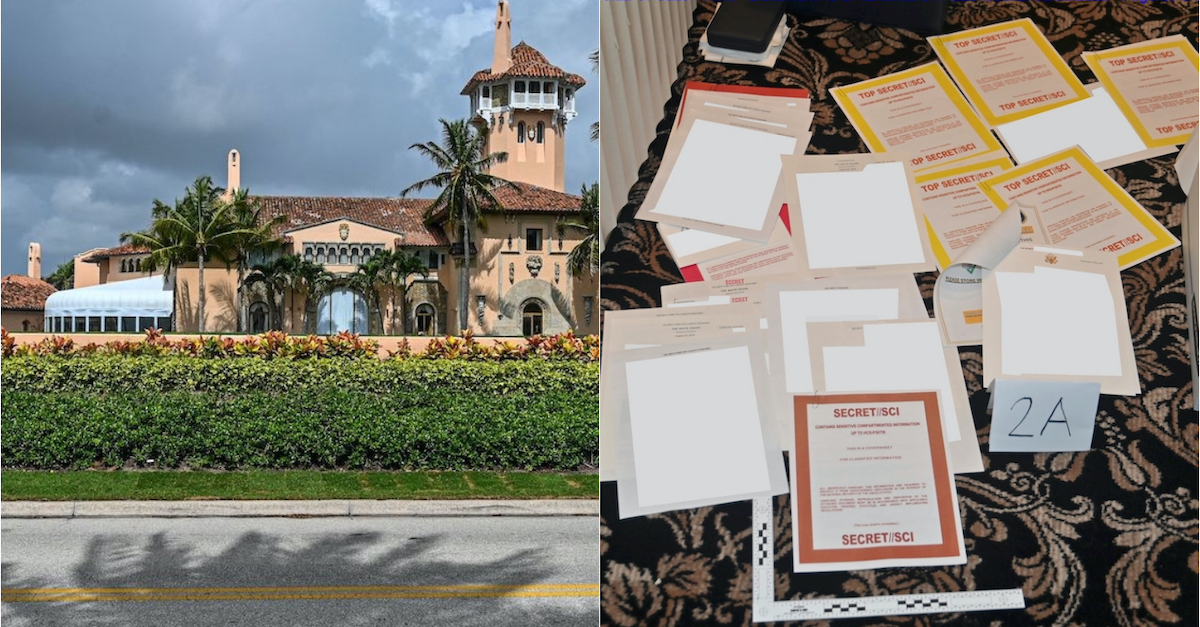
On the left, former President Donald Trump’s residence at Mar-A-Lago is pictured on Aug. 9, 2022. The photo on the right shows the highly classified documents that the FBI found inside Trump’s office. (Photo of Mar-a-Lago by Giorgio Viera/AFP via Getty Images; classified documents found in the search via DOJ)
A federal judge granted former President Donald Trump’s request to have a special master to review files the government seized at Mar-a-Lago last month — and for now, blocked the Department of Justice from using them for an active criminal investigation.
The Labor Day ruling, issued during a court holiday as the United States marks the traditional end of summer, indicates that the special master will review the files for attorney-client privilege and executive privilege.
“Furthermore, in natural conjunction with that appointment, and consistent with the value and sequence of special master procedures, the Court also temporarily enjoins the Government from reviewing and using the seized materials for investigative purposes pending completion of the special master’s review or further Court order,” U.S. District Judge Aileen Cannon, a Trump appointee, wrote in a 24-page order. “This Order shall not impede the classification review and/or intelligence assessment by the Office of the Director of National Intelligence (‘ODNI’) as described in the Government’s Notice of Receipt of Preliminary Order.”
Prosecutors argued that the appointment of a special master was unnecessary because the Justice Department’s privilege-review team already completed its scan of the documents — and warned that any delay could harm what they described as an “active criminal investigation.”
Legal experts broadly questioned the need for a special master, noting that the files at issue belonged to the government and not the former president. Trump’s former attorney general Bill Barr characterized the request for a special master bluntly as a “red herring,” “waste of time” and later, a “crock of shit.”
Cannon emphasized that, in ruling in Trump’s favor, she was not endorsing his attorneys’ insinuations of government misconduct.
“[T]he Court agrees with the government that, at least based on the record to date, there has not been a compelling showing of callous disregard for Plaintiff’s constitutional rights,” she wrote.
For Cannon, the uncharted nature of the dispute was enough.
“Hence, the Court takes into account the undeniably unprecedented nature of the search of a former President’s residence; plaintiff’s inability to examine the seized materials in formulating his arguments to date; plaintiff’s stated reliance on the customary cooperation between former and incumbent administrations regarding the ownership and exchange of documents; the power imbalance between the parties; the importance of maintaining institutional trust; and the interest in ensuring the integrity of an orderly process amidst swirling allegations of bias and media leaks.”
More than 100 of the documents retrieved during the search had classification markings, and more than 11,000 other government documents did not. The absence of markings does not mean that the latter set of documents were not, in fact, classified.
“The Court pauses briefly to emphasize the limits of this determination,” the order states. “Plaintiff ultimately may not be entitled to return of much of the seized property or to prevail on his anticipated claims of privilege. That inquiry remains for another day. For now, the circumstances surrounding the seizure in this case and the associated need for adequate procedural safeguards are sufficiently compelling to at least get Plaintiff past the courthouse doors.”
The Justice Department has not indicated whether it plans to appeal the ruling, telling reporters only that it is reviewing the order and considering next steps. The parties have until Friday, Sept. 9 to decide on candidates for special master.
Read the order, below: